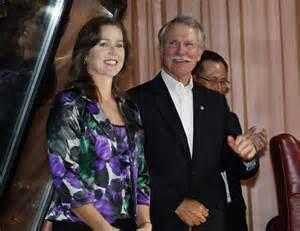
Oregon Live: Cylvia Hayes has confirmed she collected $118,000 in previously undisclosed payments from an out-of-state clean energy group.
Hayes acknowledged via email to the EO Media Group/Pamplin Media Group that the Clean Economy Development Center paid her $30,000 in 2011 and $88,000 in 2012. She was Gov. John Kitzhaber’s policy adviser on clean energy and economic development during that time. The media group reported the development online late Tuesday.
The disclosures mean Hayes has collected at least $203,000 in consulting fees since Kitzhaber took office in 2011.
The admitted payouts conflict with other statements Kitzhaber has made regarding his fiancee’s consulting work, how his office handled her contracts and most troubling, statements he has made in his annual ethics filings.
The income also doesn’t match what’s reported for those years on federal tax forms Hayes provided to The Oregonian/OregonLive.
Hayes and the governor didn’t respond Wednesday to written questions or requests for comment about the payments, ethics issues and the tax filing. Hayes hasn’t responded to questions or interview requests from The Oregonian/OregonLive since October.
Undisclosed contracts
Those first two years of Gov. John Kitzhaber’s third term followed a controversy surrounding Hayes’ Bend-based company, 3E Strategies, and a contract with the Oregon Department of Energy. Hayes and her company were cleared of any wrongdoing, however, she and Kitzhaber later assured media and constituents that they’d instituted a series of changes to avoid any potential ethical issues in the future.
For his part, Kitzhaber said that he created a conflict of interest process within his office requiring Hayes to disclose — and share copies of – her contracts with the governor’s staff attorney.
Yet it appears that Hayes did not complete such disclosure forms for her contract with the Clean Economy Development Center of Washington, D.C., or three others: Waste to Energy of Texas; HDR One Co., of Portland; and Rural Development Initiatives of Eugene.
In mid-October, The Oregonian/OregonLive requested government documents from Kitzhaber’s office regarding Hayes three most recent contracts as well as “any other conflict-of-interest matters brought to the attention of Liani Reeves,” the governor’s staff attorney.
In response, the governor’s office released Hayes’ most recent disclosure forms and contracts – with Resource Media, Energy Foundation and Demos – as well as limited email traffic between Hayes and governor’s office staff regarding those three contracts. The governor’s office did not release any other conflict of interest forms.
When Hayes’ contracts came under fire during Kitzhaber’s re-election campaign last fall, he submitted a series of questions and documents to the Oregon Government Ethics Commission seeking advice on whether his office had correctly handled Hayes’ work.
The governor submitted Hayes’ most recent contracts to the ethics commission but did not submit any contracts or disclosure forms for her work in 2011 and 2012, including the Clean Economy Development Center fellowship.
“In an abundance of caution, over the past three and a half years the Governor’s office has treated Cylvia Hayes in her First Lady role as a “public official” in order to ensure compliance with state ethics statutes,” Reeves wrote in her letter to the commission. “Accordingly we have reviewed her proposed professional business activities and have put measures in place to avoid any conflicts of interest.”
The state’s ethics commission refused to address Kitzhaber’s questions, saying it could not address issues that have already occurred. As a public official, Hayes is bound by state ethics laws that forbid public officials from using their role to gain personally.

The ethics commission is currently reviewing two ethics complaints filed against Kitzhaber and Hayes and will decide in March whether to move forward with a formal investigation.
Conflicting reports
On the tax return that Hayes provided to The Oregonian/OregonLive, Hayes noted that her salary and business income for 2011 totaled $52,203. According to ethics disclosure forms Kitzhaber filed with the state, 2011 was the year Hayes held four different contracts, including her fellowship with the Clean Economy Development Center that Hayes now says was worth $30,000.
Hayes also said the development center paid her $88,000 in 2012. Yet in her tax filing for that year, her business income was noted as $27,361. She listed no wages or salary.
In his own ethics filing covering 2012, Kitzhaber noted that his household received income from Hayes’ 3E Strategies. Section No. 7 of that form directed the governor to list any household income of $1,000 or more from groups with business, legislative or administrative interests in Oregon.
Hayes now says she was paid $88,000 by the Clean Economy Development Center that year, yet Kitzhaber wrote “None.” When asked on Wednesday to reconcile Hayes’ tax return in 2012 with the fellowship contract amount reported by EO Media, neither Hayes nor the governor’s office returned repeated emails and calls.
The fellowship
While Hayes was willing to disclose to EO Media/Pamplin how much money she’d collected from her fellowship, the first lady wouldn’t share what work she’d done with the Clean Economy Development Center. Still, Hayes has highlighted the fellowship on her business website, in numerous biographies that she submitted when she spoke at conferences and on her First Lady of Oregon page linked from the governor’s web site.
Jeffrey King, listed as executive director of the center, did not return calls or emails seeking comment regarding Hayes’ work. Once an executive for the now-defunct Hollywood Entertainment, King noted on the professional networking site LinkedIn that he’s been with the Clean Economy Development Center since 2010. He also referred to the center on LinkedIn as a political organization.
The center’s website says it works with business, government and nonprofit “partners” on a various clean energy issues and projects, and in turn works to link up those “partners” with federal, state and private-sector grants. According to the center’s website, the group did work in Oregon.
While the center received a number of foundation grants last year, it no longer holds its nonprofit status. According to the nonprofit tracking site Guidestar, the IRS revoked the development center’s tax-exempt status for failing to file tax forms over three consecutive years.
The center’s financial records may not be filed, but a large San Francisco-based foundation has confirmed it foot the bills for Hayes’ fellowship.
Jenny Coyle, a spokeswoman for the Energy Foundation, confirmed that it paid the Clean Economy Development Center for Hayes’ fellowship. The foundation’s grant database also shows it gave $25,000 to the center in November 2013 to “build markets” for clean transportation fuels, along with another $97,500 for a similar project in February 2014.
What a coincidence this all came to light after the governor’s FOURTH re-election to the state, not.
DCG

